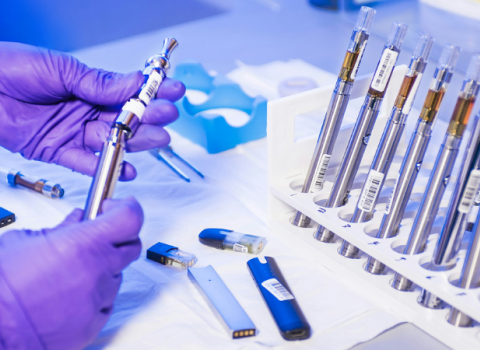The US and UK have already bolstered security rules. Now groups in Europe want the EU to follow suit

Phot credits: MJH SHIKDER / Unsplash
Organisations concerned with pandemic prevention are urging the European Union to introduce new safety measures to stop rogue groups ordering DNA that could be used to create deadly pathogens.
The United States and UK have already toughened up screening of online DNA orders, but so far, the EU hasn’t acted.
Currently, if suspicious individuals order the kinds of fertiliser that can be used to make bombs, “flags would go off somewhere,” said Eloise Todd, executive director of the Pandemic Action Network (PAN), a global umbrella group of pandemic prevention and preparedness bodies.
“How do we make sure that happens on the biological front? That's not yet in place in the same way for these new technologies,” she said.
PAN and Pour Demain, a European non-profit that campaigns for better biosecurity, have been speaking to the Commission about introducing some form of DNA screening rules.
"The EU has an opportunity to lead globally in responsible biotechnology innovation,” said Laurent Bächler, programme lead for biosecurity at Pour Demain. “By implementing nucleic acid screening standards, we can ensure Europe remains at the forefront of both scientific advancement and biosecurity.”
The worry is that terrorists, rogue states, or even disaffected individuals could order fragments of DNA online, and with inexpensive equipment and some scientific knowledge, assemble them into a pathogen, potentially reviving eradicated diseases such as smallpox, or developing entirely new pathogens.
To illustrate the danger, a team at the Massachusetts Institute of Technology last year claimed they had easily evaded existing screening measures and ordered fragments of the 1918 influenza virus. DNA synthesis companies argued the exercise was flawed, and a number of private firms already have their own voluntary screening systems, but this doesn’t cover the whole industry.
Canadian researchers have also used mail-order DNA to reconstruct the horsepox virus, a relative of smallpox.
Meanwhile, advances in AI make it easier to evade existing screening methods or could guide amateur scientists through the process of making a pathogen, warned PAN, Pour Demain, Rand Europe and the International Biosecurity and Biosafety Initiative for Science in a briefing for EU policymakers last November.
Government action
These worries have begun to trigger government action. In 2023, the US announced in an executive order focused on AI that federal life-sciences funders would require any DNA synthesis companies receiving government money to use a new screening framework.
While US president-elect Donald Trump has promised to roll back this executive order, screening mandates have already been established and are expected to remain in place.
The UK has started to take action too, last October putting out new screening guidelines to DNA companies.
As DNA synthesis has become more accessible, this could make it “easier for hostile actors to obtain the components of dangerous biological systems that could cause harm, including pathogens,” the guidelines warn.
Meanwhile in the EU, concern about misuse of synthetic biology has begun to bubble up in official and expert reports.
Last October, a report prepared for the Commission on the bloc’s civil and military preparedness warned of new pandemic risks, including “accelerating biotechnological innovation facilitating the development of synthetic pathogens.”
The following month, an EU expert advisory group on research and technology warned that a “non-state actor developing pathogens for a bioterrorist attack represents a low-probability but high-impact security risk.”
Basic materials and DNA labs have “become affordable for individuals.” it said. Major financial obstacles to “advanced amateur gene editing” will disappear in 5-10 years time, the Community for European Research and Innovation for Security predicted.
The Commission did not respond to a request for comment before Science|Business’ deadline.
Regulatory burden
Tougher screening of DNA orders could add time and costs for universities and life-science companies, just as the Commission is trying to cut back red tape and stimulate the bloc’s economic growth. But if a rogue actor used DNA ordering to create a dangerous pathogen, this could bring a “sledgehammer” of regulation down on the synthesis industry, making life far more difficult for ordinary researchers, Todd argued.
And, of course, any regulatory costs would be dwarfed by an outbreak itself. “A pandemic that wipes out half your population is going to be much more of a drag on the economy,” she said.
There are also questions over how a screening system should work in practice. It could focus on flagging up risky DNA fragments, or whether the person ordering the DNA seems suspicious, or a combination of both.
Then there is the question of how governments would make sure DNA order companies comply. The US system incentivises firms by making screening a precondition of federal funding, but this probably wouldn’t deter a DNA company that only caters to private customers. “Is this enough [. . .] incentive for them to be doing the screening? That we’re not sure about,” said Velislava Petrova, biotechnology director at the Centre for Future Generations, a Brussels-based think tank that works on biosecurity that has also discussed DNA screening with the Commission.
More rigorously, the EU could prevent any DNA company in the world from selling to EU customers unless it had screening protocols in place, creating a global screening effect. “I think that would be better,” said Petrova.
But overall, screening tools alone aren’t a silver bullet that will eliminate the risk of an engineered pandemic, she said. “We are more trying to look at how it would work with a whole suite of regulation and legislation,” she added.
It’s also unclear exactly how the EU would put new screening rules in place, but the Commission is expected to unveil a new European Biotech Act this year, which could incorporate tougher measures.
Editor's note: this article has been updated to clarify that Pour Demain is a European, rather than exclusively Swiss, organisation





 A unique international forum for public research organisations and companies to connect their external engagement with strategic interests around their R&D system.
A unique international forum for public research organisations and companies to connect their external engagement with strategic interests around their R&D system.